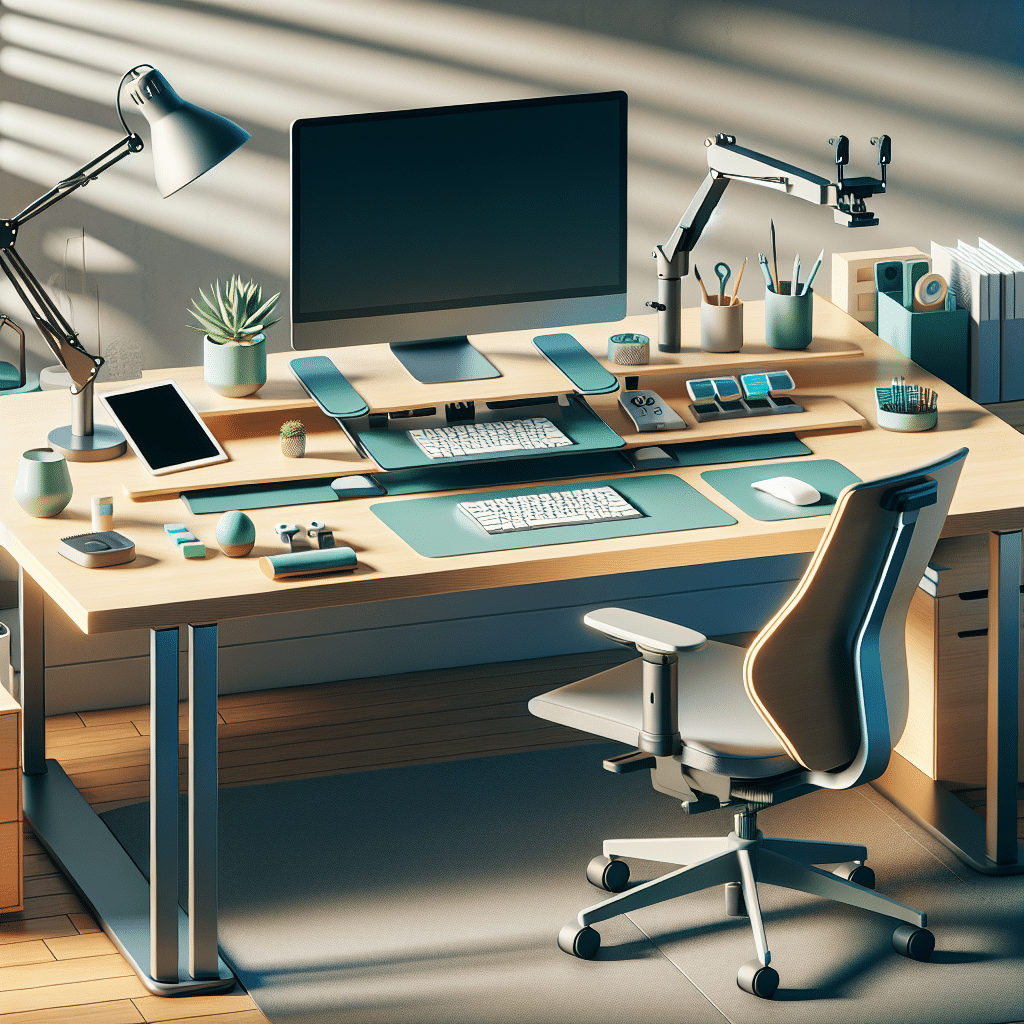The Importance of Ergonomic Desk Accessories
In today’s fast-paced world, many professionals spend hours at their desks, often sacrificing comfort for productivity. Ergonomic desk accessories are designed to alleviate physical strain and enhance comfort, leading to improved health and work efficiency.
Key Ergonomic Accessories
1. Ergonomic Chair
An ergonomic chair is pivotal for maintaining proper posture. Look for features like adjustable seat height, lumbar support, and armrests that can be customized. A chair with good lumbar support helps maintain the natural curve of your spine, reducing the risk of back pain.
2. Adjustable Standing Desk
Standing desks allow users to shift between sitting and standing positions, promoting better circulation and reducing discomfort caused by prolonged sitting. Models with electric height adjustments make it easy to find your optimal working position with just a push of a button.
3. Keyboard and Mouse
These peripherals significantly impact comfort and efficiency. Ergonomic keyboards often have a split design that promotes a more natural hand position, reducing strain on the wrists. Similarly, ergonomic mice contour to the hand’s natural shape, minimizing unnecessary wrist movement.
Effective Mouse Pads
4. Wrist Support Mouse Pad
Using a mouse pad with built-in wrist support can mitigate wrist strain. Look for options made from memory foam or gel that can contour to your wrist, providing comfort during long hours of use.
5. Horizontal and Vertical Mice
Horizontal mice are the traditional design, but vertical mice, which position the hand more naturally, can reduce wrist pronation and the risk of repetitive strain injuries (RSI). They encourage a neutral grip that is beneficial for users who spend substantial time on a computer.
Monitor Adjustments
6. Monitor Stand or Arm
A monitor stand or arm elevates your screen to eye level, ensuring that you don’t tilt your neck downwards or upwards, which can lead to neck strain. Look for adjustable options that allow you to pivot, swivel, and rotate the monitor for optimal viewing angles.
7. Screen Filters
Anti-glare screen filters reduce eye strain caused by glare from windows and overhead lights. Blue light filtering options can also decrease the risk of eye fatigue, making it easier to work for extended periods.
Desk Organization
8. Cable Management Solutions
Tangled cables can create a cluttered workspace and cause distractions. Cable management solutions, such as clips, sleeves, or cable trays, help keep your workspace organized, reducing visual clutter and increasing efficiency.
9. Desk Organizers
An ergonomic desk organizer can keep your tools within arm’s reach and promote an organized environment. Opt for organizers that allow you to categorize items while maintaining accessibility, enhancing productivity without causing strain as you search for essentials.
Lighting and Acoustics
10. Task Lighting
Good lighting is crucial in a workspace. Adjustable task lamps provide focused light, helping minimize eye strain and illuminating your work area effectively. Look for LED lamps with adjustable brightness to customize the lighting according to your task requirements.
11. Soundproofing Panels
For a peaceful work environment, consider soundproofing panels that help absorb sound and reduce distractions. It can enhance concentration, making it easier to focus on tasks without the interference of surrounding noise.
Foot Support
12. Footrests
Footrests offer support for your feet, improving circulation and providing comfort while sitting. Look for adjustable models that can accommodate various heights and styles, ensuring ergonomic alignment with your chair and desk.
13. Foot Massagers
For those who spend prolonged hours seated, a foot massager can be a luxurious yet beneficial accessory. Regular usage can improve circulation and reduce fatigue, adding comfort to your workspace.
Personal Customization
14. Personalized Accessories
Your workspace should reflect comfort and style. Invest in personalized accessories like customized chair cushions or unique keyboard covers that resonate with your personality. These add a touch of individuality while promoting ergonomic benefits.
Rest and Recovery
15. Break Reminders
Using software or mobile applications as break reminders can encourage you to stand, stretch, or engage in short walking breaks throughout your workday. These intervals can significantly reduce fatigue and improve overall well-being.
Maintaining the Ergonomic Setup
16. Regular Adjustments
Regularly assess and adjust your workspace as needed. Body mechanics and comfort levels change; being proactive in modifying your environment is key to sustaining ergonomic health.
Conclusion
Creating an ergonomic workspace is a personalized journey that can have profound impacts on health and productivity. Invest in quality ergonomic desk accessories, adjusting them according to your needs. By prioritizing comfort, you enhance not just your working conditions but your well-being too.
